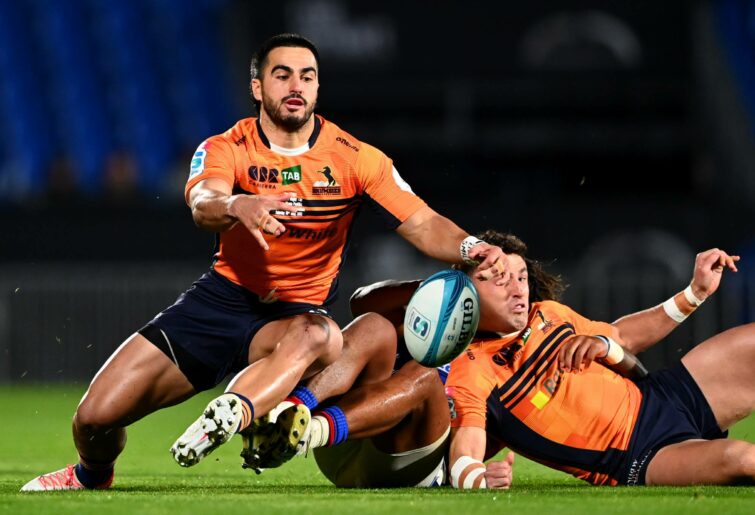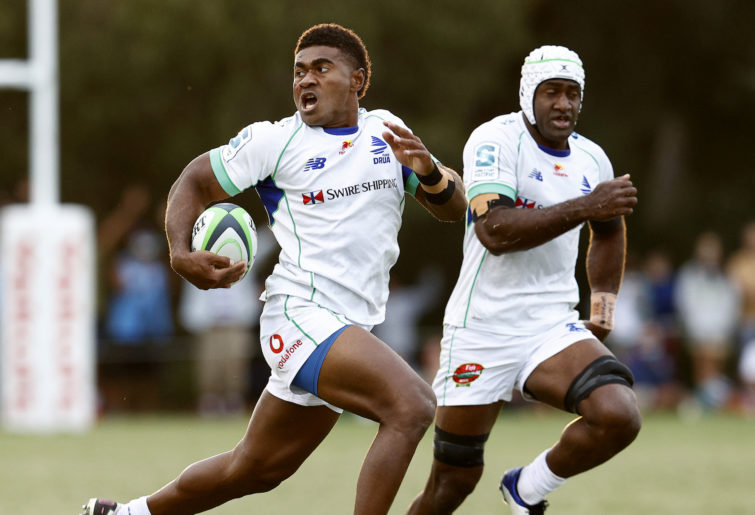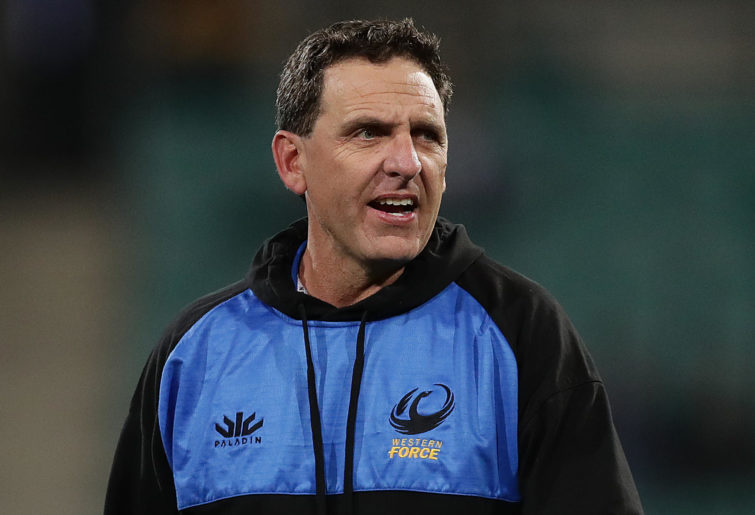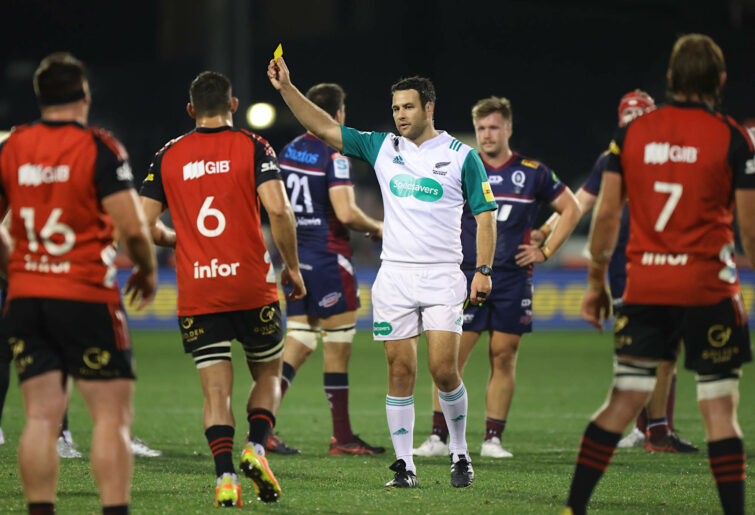A highly respected sports journalist – who shall remain nameless – described on Friday how he was underwhelmed by the prospect of a final round routinely feeding into a final eight that was as good as pre-determined months ago.
“Now there’s plenty of you that love rugby so much that you’ll need no excuse to watch a couple of matches this weekend, but I’ve been through the list and cannot find one to hang my hat on, so I’m having a bye week and will re-join you for the playoffs,” he wrote.
It’s impossible to argue that having two-thirds of the competition qualify for finals action doesn’t stretch credibility beyond breaking point, nor that a battery recharge away from the TV every now and then isn’t a good thing.
But as ever, sport finds a way of throwing up gifts in places where you least expect to find them. This, it turns out, wasn’t the weekend to switch off and go fishing.
In the end, Super Rugby’s final eight worked itself out the way most people thought it would, back in February; all five New Zealand sides and the top three Australian franchises.
But that doesn’t tell the tale of a thrilling final round, full of emotion, upsets and another after-the-siren dropped goal from title favourites, the Blues.
Maybe, knowing that whatever happened there were bigger battles to be won next weekend, the edge was off the Chiefs, Brumbies, Waratahs and Hurricanes. Easy to say, and who knows exactly how the sub-conscious mind inhibits urgency and intensity?
But watching the weekend’s matches unfold, it never really felt like that. These are all professional players with instincts to win, and all of the contests were genuinely hard-fought.
What is more apparent was that, in any given week, the gap between most of the sides is narrower than what many believe. If you’re slightly off your game, you can, and probably will, be punished.
What is great for this competition moving forward, is that things are likely to narrow even further. The golden days of the late ’90s and early 2000s might be gone forever, but this weekend’s results speak to Super Rugby being off life support, and finding new direction and energy.

(Photo by Getty Images)
Much of that is due the contribution of the two new franchises. While there have been some flat moments – everything you’d expect from fledging sides playing against well-seasoned franchises – what they have brought to the table has exceeded all expectations.
The challenge now for SANZAAR is to tap into the enthusiasm that surrounds the Fijian Drua and Moana Pasifika franchises, and bleed this into all of the other franchises, where a significant portion of the fan bases lay dormant, disconnected or lapsed.
After a stunningly successful debut in Suva, it was Lautoka’s turn to host their first Drua match; the home crowd pulsing with electricity throughout their side’s narrow 35-34 loss to the Chiefs.
Oppressive humidity and a slippery ball didn’t make for a match of the highest quality. But when the Chiefs hit the wall at precisely the same time the Drua hit their stride, scoring three tries in the last ten minutes, excitement levels went through the roof.
So irresistible was the wave of blue and green, just another two or three minutes would surely have delivered them the win. But defeat can also bring honour; not a soul would have left the stadium disappointed.
Immediately after the whistle, the players linked arms in the centre, a hymn was sung, and cultural and physical respect oozed through our televisions. In moments like these, life’s troubles and daily travails are made to seem wholly insignificant. A trip to Fiji for a Drua match is now an essential addition to any bucket list.
The hero and villain of the day was the Drua’s best player for the season, Vinaya Habosi. Habosi not only delivered the season’s worst goal-line drop out, but with the Drua right in the contest at 21-13, he inexplicably failed to let a kick-off go out on the full, instead batting it back infield, for the Chiefs to run onto and score.

(Photo by Darrian Traynor/Getty Images)
In true Habosi style, he came right back, recovering a deep kick and ducking under a tackle on his goal-line, before jetting off upfield and sending Rauvovu away under the posts. Ninety-nine metres of magic, and straight to the top of the ‘try of the year’ table.
Chiefs’ captain Brad Weber was right to acknowledge afterwards how difficult it is going to be in coming seasons for sides to travel to Fiji and win. While his broad smile spoke to his delight at escaping with the points, it also told the story of Brodie Retallick, who, for someone playing his first match in weeks, was outstanding.
Moana Pasifika saved their best for last, in what can only be described as a stunning upset of the Brumbies, in Auckland.
While there was no shortage of skill, what won them the match 32-22, was their physicality; harder than the Brumbies on both sides of the ball.
There was a healthy dose of mental fortitude thrown in as well. Having lost inspirational captain Sekope Kepu to a red card for a high shot on Andy Muirhead, instead of folding, Moana Pasifika turned things around to such an extent, that by half-time it was the Brumbies who were folding under pressure, losing two of their players to the sin bin.
There was humour as well; a player from each side losing their head in white-line mist, taking a quick tap penalty only to fumble it, when saner heads would have played the set-piece percentages.
But mostly there was joy for Moana Pasifika’s inspirational founders, almost unbelieving that here was their second big scalp, in what most people predicted would be a tough, winless, first season.
There isn’t much that can be said for the Brumbies other than, win lose or draw, they will come out next week against the Hurricanes far harder at the contest.
The first half at Leichhardt was an old-fashioned arm-wrestle, with the Waratahs figuring out after half-time how to put Mark Nawaqanitawase into space, jumping out to a 14-3 lead.
For a supposed second-string side, the Blues worked themselves back into the game impressively. As he’d done a week earlier in Perth, veteran lock Luke Romano was the glue that held it all together, immense in contact and in the way he drew his pack in and around him.
Locked at 17-17 and staring golden point extra-time in the face, the Blues held their nerve, worked the ball into the red zone, where Zarn Sullivan, facing an intense defensive rush, did the business with his left foot.
To win with an after-the-siren drop-goal one week might be viewed as lucky. To do it twice is the sign of a side with an unimpeachable culture. A winning culture. With their big guns back on board this week, the Blues will be mighty hard to toss from here.
In the late game, things came rather too easily at times for the Hurricanes, with Brayden Iose striding out like an Olympic 400m runner, a sign of the class difference between the two sides.
But everyone knows the Force script; always stay in the fight. Which is exactly what they did, harrying the Hurricanes into error, and adding a few finishing touches to their own work that helped sign off coach Tim Sampson’s tenure with a satisfying 27-22 win.

(Photo by Mark Metcalfe/Getty Images)
They would have loved an extra week of course, but the Rebels came up a try short on Sunday. That’s no more or less than what it should have been; the Force came agonisingly close, but any side that ends up relying on other results to fall their way can have no cause for complaint.
That ‘missing try’ came early in the piece, Rebels’ stand-in fullback Nick Jooste denied due to the officials harshly determining that halfback James Tuttle had knocked the ball on earlier in the movement.
For long periods, the Highlanders dominated, yet once the Rebels hung on to the ball more and found better field position after half-time, the tries came; Jooste, Lukas Ripley and Young Tonumaipea all finding the try-line.
After their heartbreak against the Chiefs two weeks ago, there was no way the Rebels were capitulating this time; their 31-30 victory sealed courtesy of a solid defensive line and a Richard Hardwick steal.
One thing the Rebels have done in recent weeks is score points; since the NZ crossover, averaging 26 points per match. Much of that is due to Rob Leota and Pone Fauma’asili returning to provide the ball carrying punch that was absent in the earlier rounds. They are far from the finished package, but the improvement is obvious, and there is a sound base from which to springboard into next season.
Post-match, Highlanders coach Tony Brown and captain Aaron Smith embraced the underdog tag for their quarter-final, and while all the right words were said, and they will front up in Auckland ready and willing to give their all, I’m not convinced that even they are convinced they can win.
The only match that didn’t have a significant bearing on the quarter-finals or wasn’t a thriller, was the first in Christchurch, where the Crusaders, despite being nowhere near their best, comfortably held off the Reds, 28-15.
The match was significant for the Reds, becoming the only Australian franchise not to score a win against a New Zealand team – who would have thought that six weeks ago? – and the Crusaders’ George Bridge wearing his shorts far higher than any cool, self-respecting winger would normally care to do.
A major talking point was the yellow card shown to Pablo Matera for a tip-tackle on Jordan Petaia, with many comparing this to Sam Gilbert’s tip of Michael Hooper last week, querying the injustice and apparent inconsistency in the treatment.

(Photo by Peter Meecham/Getty Images)
The reaction is understandable. Both acts were foolish, reckless and dangerous. But no matter the vibe, no matter the ill-logic, the law and decision framework as it is written, supports the decision of both referees, Ben O’Keeffe and Nic Berry, who duly got their yellow card and red card decisions exactly right.
Lifting a player about the horizontal and not ensuring they are returned to the ground safely, is an act of foul play. Sanction is determined by how the lifted player lands; arm, shoulder, back or side merits a yellow card, whereas direct landing on head or neck warrants a red card.
A side view clearly showed Petaia landing on the point of his shoulder. That alone is enough to render the criticism of O’Keeffe unfair and, in some cases, unhinged.
Nevertheless, an uneasy logic exists around the sanction for acts of this kind being dependent on a random outcome. Luck of the draw. Is there really five and a half matches worth of difference between the actions of Matera and Gilbert?
Enter SANZAAR’s judicial review committee, who retain the power to cite Matera and who, by the time this column is digested, may have done so. The reason for that is, despite O’Keeffe adhering correctly to the decision framework, the committee may still determine that the height from which Matera dropped Petaia, and the danger posed to Petaia, may override factors stated in the framework related to the initial point of contact with the ground.
Whatever the judicial outcome, it is clear that players and coaches must take responsibility. The technique of grabbing hold of an opponent between the legs to effect a cleanout, is nothing more than a ticket to potential disaster.
Full credit then to coach Scott Robertson, for blocking Matera’s return to the field at the completion of his sin bin. This was the act of a coach understanding how wrong his player’s actions were, and applying his own heavier sanction, but also signalling to his team that, entering finals, he wants all 15 players on the field, at all times.
As if Super Rugby didn’t deliver enough drama over the weekend, it was heartbreak for Leinster in the European Champions Cup final, going down 24-21 to La Rochelle, courtesy of a final-minute try to Arthur Retiere.
All of the usual cliches apply; this was a clash of Test match intensity, a war of attrition, a true final between these two high quality sides.
It was an Irish victory of sorts, with Ronan O’Gara the victorious coach, almost apologetic afterwards, in commiseration for his Leinster counterparts.
Those are the types of values, as were on display on the other side of the world in Luatoka, and in the losing Hurricanes sending retiring Force lock Jeremy Thrush out with a stirring post-match haka, that make rugby such a wonderful game.
































































































